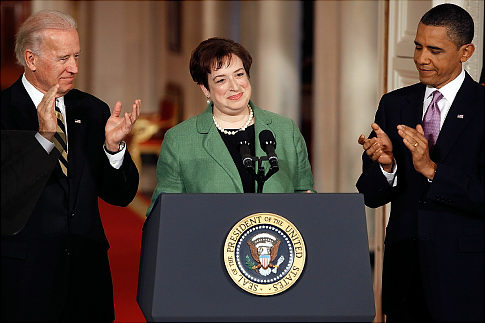
I seldom respond directly to letters or articles critical of positions taken in my commentaries. I consider myself fortunate to have venues for expressing my opinions and, having had my say, I believe that others should have a chance to disagree. Sometimes, however, a re-rebuttal seems in order if it provides additional information for readers to weigh.
In “Judging Elena Kagan“, I wrote of her decision as Dean of Harvard Law School to reinstate a policy banning the military services from using the law school’s main career office for recruiting while allowing other agencies and employers to do so. She did this, she indicated, because of her opposition to the military’s ban on homosexuals serving openly in the armed forces. I pointed out that the military was, in fact, complying with the “don’t askdon’t tell” policy, established by the Clinton Administration after an unsuccessful effort to overturn the ban by executive order. That policy was subsequently enacted into law by Congress. In following that policy, therefore, the military was complying with the law of the land as it is required to do. I commented further that Ms. Kagan’s policy was symptomatic at the time of a strident anti-military culture at Harvard and some other elite universities.
In response to my commentary, Peter Stenad, writing in the Coronado EagleJournal, cited an article in the May 11th edition of The Wall Street Journal, for what, in his words, “appears to be a more informed description of the Harvard Law School policy on military recruiting and Ms. Kagan’s handling of it.” The article, written by former Harvard Law School Dean Robert C. Clark, is entitled “Kagan and the Military: What Really Happened.” In it, the author endeavors to explain the history of military recruiting at Harvard Law. According to Mr. Stenad, Clark said that military recruiters were never banned and that Kagan reinstated the policy of allowing the military recruiters use of the career office. Mr. Stenad quotes Mr.Clark as concluding that it would be very wrong to portray Elena Kagan as hostile to the U.S. military and that quite the opposite was true.
Well, you could have fooled me. For perhaps an even more informed account of what was going on at Harvard, I refer the reader and Mr. Stenad to an op-ed by Sen. Jeff Sessions (R-Ala.), ranking member of the Senate Judiciary Committee. The piece appeared in the June 19 edition of The San Diego Union-Tribune. He recalls, accurately in my view, the shameful discrimination against the military practiced by many of our elite academic institutions. I myself was aware of some of it while attending the Harvard Business School in 1971. For example, I was once dared to walk across Harvard Yard in uniform. On another occasion, I was told that I could never be forgiven for what happened in Vietnam. Those were the days when it was fashionable on some campuses to refer to Vietnam veterans as “baby killers”.
After Congress enacted into law the “don’t askdon’t tell” policy, a policy initiated by the same Clinton administration that Kagan loyally served, the situation grew worse. Major law firms and corporations could recruit on campuses that university administrators and faculty activists put off limits to military recruiters. Congress eventually was pushed to take action. The Solomon Amendment, passed in 1995, required universities to provide equal access to the military if they wished to keep federal funding including lucrative government research contracts.
Sen. Sessions says that Harvard disregarded the new law and continued to block access of military recruiters. Acting on the Solomon Amendment, the Department of Defense finally threatened to cut off such funding. Harvard Law subsequently caved under pressure and allowed access. This was the policy status when Ms. Kagan became dean in 2003. But instead of following that policy, she reversed it, again denying access to military recruiters. According to Sen. Sessions, she filed a legal brief to challenge the Solomon Amendment so that she could block military recruiters without jeopardizing the millions in taxpayer dollars that Harvard received annually. “Simply put,” said Sessions, “Harvard was legally bound by the Solomon Amendment every single day that Kagan was dean.”
The U.S. military consistently enjoys one of the highest, if not the highest public approval ranking of any institution in America. It is a model of racial, ethnic, gender and religious integration and if the ban on homosexuals serving openly is lifted, I am certain that it will support that law as well. The services provide excellent career opportunities, education and upward mobility to millions of young Americans. Denying access to military recruiters because of a social agenda was not only unfair to those who were denied information regarding these career opportunities, it was unfair to the nation because it denied the services access to some of the best and brightest from our premier universities who may have wanted to serve and who had much to offer.
Elena Kagan, in my view, showed contempt for the law and for the military which make her a deeply flawed candidate for the highest court in the land. Actions in defiance of the law should have consequences. She should not be confirmed.
Copyright 2010, J. F. Kelly, Jr.




